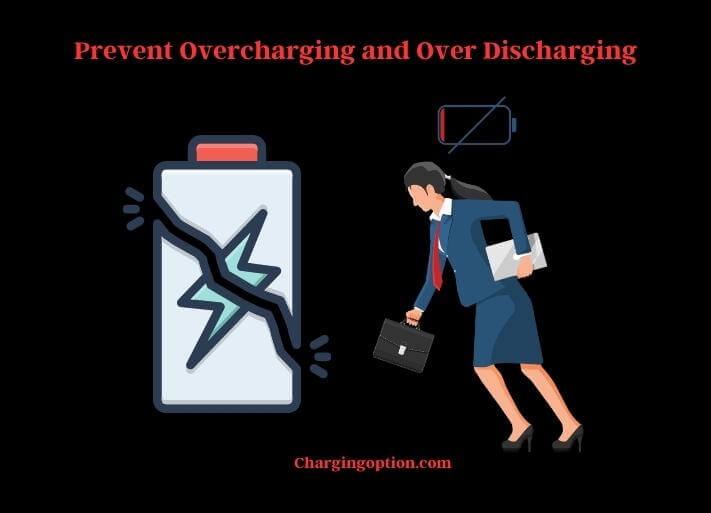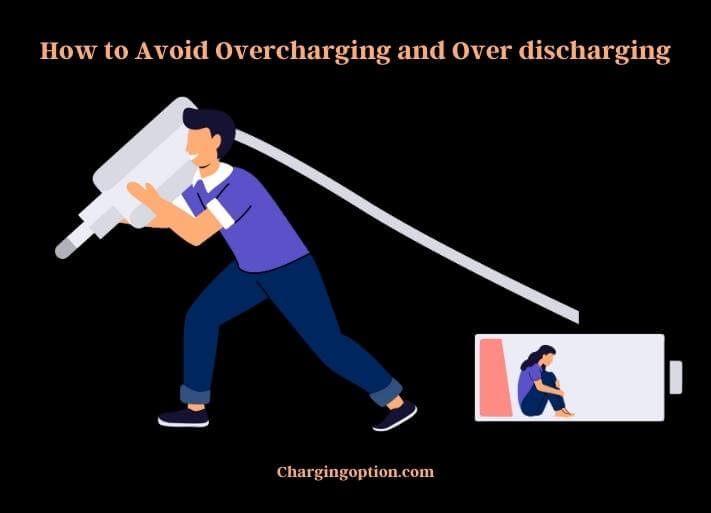The most common method of preventing overcharging and over-discharging is through the use of charging controllers. Charging controllers are sophisticated electronic devices that monitor the battery voltage and current and adjust the charging current to maintain a safe charge level.

The controllers can be programmed to stop the charging process when the battery is fully charged, or when the battery voltage reaches a predetermined level.
They can be used to limit the current when the battery is over-discharged or to provide a trickle charge to maintain a safe level of charge.
Advanced charging controllers can also provide additional features such as temperature monitoring, voltage compensation, and automatic balancing. These features help to ensure that the battery remains in a healthy state and that the user is not exposed to any risk of overcharging or over-discharging.
What are Overcharging and Over-Discharging?
Overcharging and over-discharging of a battery refer to the processes of charging and discharging a battery that exceeds its design limits. Overcharging a battery is the process of supplying more current to the battery than its design specs allow. This can cause the battery to become unstable and possibly damage the battery’s internal components.
Overdischarging is the opposite process, in which the battery is depleted of its charge beyond its design limits. This can cause the battery to not be able to store energy, leading to decreased performance and shortening the battery’s life.
In both cases, the battery will become damaged and unable to store, hold, and deliver energy as it should. Overcharging and over-discharging can cause the battery to overheat, which can lead to internal damage, corrosion, and even fire.
Causes of Overcharging and Over Discharging
Overcharging and over-discharging batteries are common issues faced by battery users. Both of these issues are serious and can cause damage to the battery and to the electronic equipment that the battery powers.
Improper Use of a Charger
The primary cause of overcharging and over-discharging is the improper use of a charger. When the charger has too high of output, it can cause an imbalance of charge and discharge, resulting in excess energy being forced into the battery. This can cause the battery to heat up and can cause damage to the cells.
Faulty Charger
If the charger is not up to specifications or is not compatible with the battery, it can put too much or too little energy into the battery. This can cause the battery to become overcharged or over-discharged.
In some cases, the battery itself may be the cause of the problem. If the battery is old or damaged, it may not be able to hold a charge properly. This can lead to an overcharge or over-discharge situation.
Faulty or Damaged Battery Cell
When the cell is damaged, it may not be able to take in or store the correct amount of energy. This can lead to an imbalance of charge and discharge, resulting in an overcharge or over-discharge situation.
Times and Procedures
The user may be to blame for the overcharging or over-discharging. If the user is not aware of the correct charging and discharging times and procedures, they may not be able to regulate the energy being used by the battery. This can lead to an imbalance of charge and discharge, resulting in an overcharge or over-discharge situation.
If you want to know can I charge a wheelchair battery with a car charger? Click here to know the answer.
Effects of Overcharging and Over Discharging
Overcharging and over-discharging are two of the most common and destructive issues that can plague a battery. Overcharging and over-discharging are both caused by a lack of adequate battery management and can cause a variety of problems, ranging from decreased battery life to potential fire and explosion hazards.
Maximum Charge Capacity
Overcharging occurs when a battery is charged beyond its maximum charge capacity. When this occurs, the battery’s chemical composition begins to break down and its voltage increases beyond the recommended level. This can cause a number of problems, including decreased battery life, an increase in heat generation, and an increased risk of fire or explosion.
You have to know that when it comes to charging electronic devices, people often try to find ways to use one charger for multiple gadgets. One such query that frequently arises is whether it’s possible to charge headphones with a phone charger.
The Battery is Drained Below Its Recommended
Over-discharging occurs when a battery is drained below its recommended minimum voltage level. This can cause a number of issues, including decreased battery life, decreased performance, and an increased risk of fire or explosion.
The effects of overcharging and over-discharging are widespread and can cause a variety of problems.
| First | Overcharging and over-discharging can significantly decrease the lifespan of a battery, as overcharging and over-discharging cause the battery’s internal components to break down faster. This can result in a battery that needs to be replaced much sooner than expected. |
| Second | Overcharging and over-discharging can cause an increase in heat generation, which can lead to potential safety hazards, such as fire or explosion. |
| Third | Overcharging and over-discharging can reduce a battery’s performance, as excessive voltage can cause the battery to become less efficient. |
In order to avoid the effects of overcharging and over-discharging, it is important to use an appropriate battery management system. A battery management system is a device that monitors the voltage and current levels of a battery, and can automatically shut down the battery if it detects an excessive voltage or current.
By using a battery management system, the risk of overcharging and over-discharging can be significantly reduced.
How to Avoid Overcharging and Over Discharging?
Overcharging and over-discharging can lead to a decrease in the overall life of your batteries and can even lead to permanent damage. Here are some tips on how to avoid overcharging and over-discharging your batteries:

Monitor Your Charge Levels
Pay close attention to the charge levels of your batteries. Make sure to check the charge level of your batteries often and use a voltmeter to check the voltage of your cells. If the voltage is too high, it’s time to stop charging and let the battery rest.
Use a Smart Charger
Smart chargers are designed to monitor the charge levels and automatically stop charging when the battery is full. This helps to prevent overcharging and is a great way to ensure that your batteries are not overcharged.
Use a Low-Charge Mode
Some batteries have a low-charge mode that will stop charging once the battery reaches a certain level. This helps to prevent overcharging and helps to extend the life of your batteries.
Avoid High Temperatures
High temperatures can cause your batteries to overcharge and over-discharge. Be sure to store your batteries in a cool, dry place and keep the area around your batteries free from dust and dirt.
Monitor Your Discharge Rates
You should also pay attention to your discharge rates. Make sure that you are not discharging your batteries too quickly or too often as this can lead to an over-discharge.
Don’t Overuse Your Batteries
Don’t overuse your batteries as this can lead to an over-discharge. Make sure to give your batteries some time to rest and recharge before using them again.
Avoid Using Damaged Batteries
Always make sure to inspect your batteries before use to ensure that they are not damaged. Damaged batteries can lead to an over-discharge and can even cause a fire hazard.
Can a Trickle Charger Prevent Overcharging and Over Discharging of a Battery?
Yes, a trickle charger can prevent overcharging and over discharging of a battery. It provides a low, constant charge to keep the battery at optimal levels without causing damage. This is particularly helpful for battery maintenance for freezing conditions, as it helps keep the battery in good condition during cold weather.
Last Assumption
Preventing overcharging and over-discharging batteries is essential for the safe and efficient functioning of electronic devices. Following the instructions provided by the manufacturer and adhering to the recommended charging and discharging times and voltage levels can help to prevent overcharging and over-discharging.
Ensuring the battery is always kept in a cool, dry, and ventilated area, avoiding extreme temperatures, and using the correct charger for the device are also important factors to consider.
Regularly checking the battery’s charge level and ensuring that it is not overcharged or over-discharged will help to maintain the battery’s health and life span. It is important to replace the battery when necessary and use high-quality replacement batteries. It is also important to make sure that the battery is not exposed to physical damage, such as being dropped or exposed to extreme temperatures.
